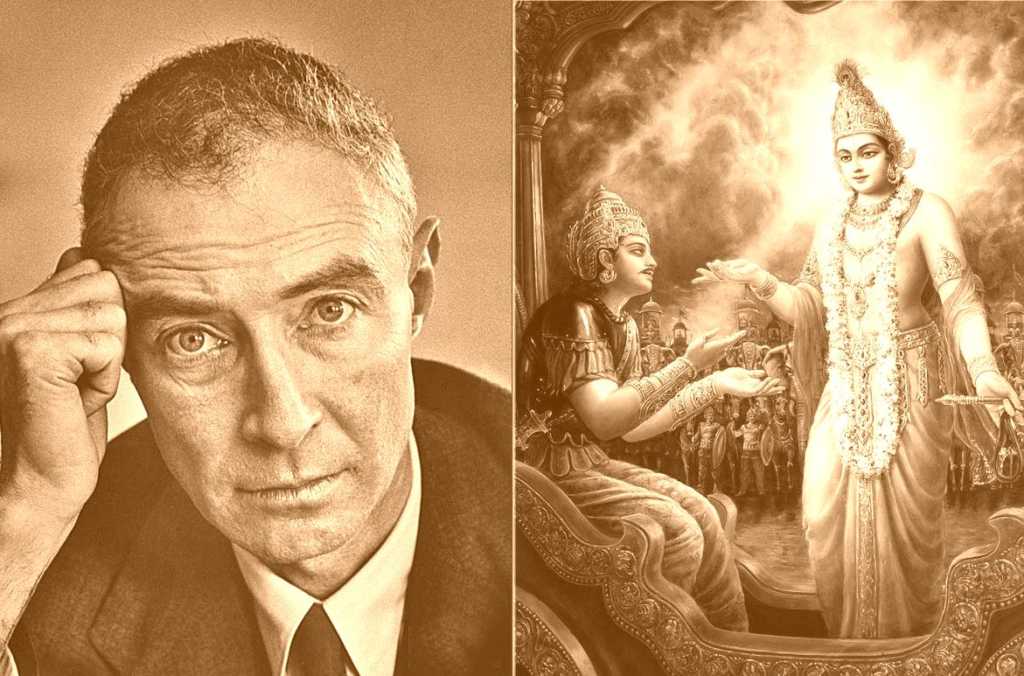February 18, 2017 marked the 50th death anniversary of Robert Oppenheimer also known as the ‘father of the atomic bomb’. As Oppenheimer witnessed the detonation of the first nuclear bomb on July 16, 1945 at the trinity test site in New Mexico he quoted Gita “Now I become death, the destroyer of the worlds” as he saw a large fireball looming over the sky. The quote is actually from chapter 11 verse 32 of the Bhagwad-Gita which is revered by Hindus as spiritual text which provides a philosophy to make a journey called life.
Oppenheimer never converted to Hinduism nor did he ever referred himself as a Hindu. Vedic philosophy did influence him greatly perhaps more than anything else. Oppenheimer took up Sanskrit lessons so he could better understand the Gita in its native tongue. He was born and raised in a Jewish family but was overtaken by the the charm and wisdom of the greatest Hindu epic the Bhagwad-Gita. According to Oppenheimer if there was anything that may be regarded as privilege the west has in 19th century it was the study of Gita. The use of Brahmastra has been mentioned in hindu scripture the Mahabharata. Its widely believed that Brahmastra was also atomic weapon. Remarkably Oppenheimer also believed at the possibility of Brahmastra on par with the nuclear ones.
There is an instance when Oppenheimer was giving a lecture at Rochester University. In the question and answer period a student asked “Was the bomb exploded at Los Amos during the Manhattan Project the first one to be detonated?
Dr. Oppenheimer replied “Well… yes. In modern times, of course”. The answer gives subtle hints to the the belief held by Oppenheimer that the atomic weapons may have been used before. Oppenheimer was so fascinated by Gita that he gave his friends a copy and kept one close to his shelf. At the funeral of Franklin Roosevelt he recited chapter 17 verse 3 from Gita which is ‘Man is a creature whose substance is faith, what faith is, he is’.
In Gita, Arjuna the Pandava prince is reluctant to fight a war with his kuru cousins. He is reluctant not because he lacks courage, or skill, but because it is a war in which his own cousins, his friends, his teachers are his opponents.
Arjuna does not want to kill them. He confides in his charioteer, who is Lord Krishna the avatar of Lord Vishnu. When Arjuna tells this to Krishna it is then Lord Krisna recites the Bhagwad-Gita which is solution to all the queries of Arjuna.
Krishna’s argument rests on three points:
1. Arjuna is a warrior and so it is his duty to fight the war.
2. It is Krishna’s job, not Arjuna’s, to determine Arjuna’s fate.
3. Arjuna should have faith in Krishna if he is going to preserve his soul.
Arjuna is eventually convinced. He asks Krishna if he will show him his godlike, multi-armed form. Krishna obliges, showing Arjuna an incredible sight as that of a thousand suns radiating in the sky. Arjuna is amazed and spellbound on seeing this form of Lord Krishna tells Arjuna that he is death and his present task is destruction.
As Gita is an ancient text, different scholars have interpreted it in their own ways. What is translated as ‘death’ is translated as ‘time’ by some scholars. The sanskrit word for both is Kaal. It may also be regarded the stretch of time was meant to be deadly one.
In wars many perish whether they participate or not. For Oppenheimer and the bomb, this may have seemed especially true. The cities of Hiroshima and Nagasaki were on the bombing list not because they were the most important, but because they had so far been spared from firebombing. They were being preserved as atomic bomb targets. Had the atomic bomb not been used or made, they probably would have been firebombed anyway. Even if the scientists had refused to make nuclear weapons, the death toll of World War II wouldn’t have been much different. In fact it could have been much larger without the the use of atomic bomb.
Oppenheimer is like Arjuna who didn’t want to kill his fellow people. But he had been forced to battle because something is bigger than himself and its the World War II. The man who hated war is forced to develop an atomic bomb because of the circumstances. It is the bomb that was developed for destruction. Oppenheimer is just the man who witnessed this. According to Gita the soul is immortal and it lives even after the body perishes. After listening to Gita, Arjuna was indifferent to war because of this as he believed his opponents would live on. In case of Oppenheimer he was not confident that death was just an illusion.
Oppenheimer’s inability to accept the idea of an immortal soul always weighed heavy on his mind. He believed he had blood on his hands of the people who died because of atomic bomb. However, it is the sense of Gita-inspired “duty” that governed his life till his death in 1967.
Even though Gita has different interpretations the actual context of Gita is much deeper and interesting than the popular understanding of it.
